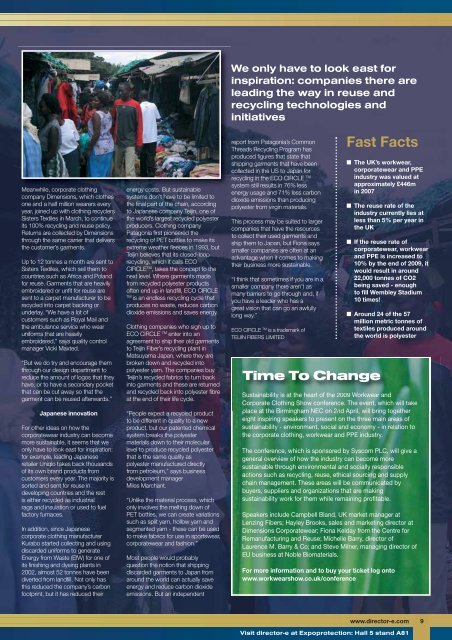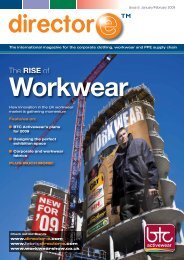newsletter - director-e
newsletter - director-e
newsletter - director-e
You also want an ePaper? Increase the reach of your titles
YUMPU automatically turns print PDFs into web optimized ePapers that Google loves.
Meanwhile, corporate clothing<br />
company Dimensions, which clothes<br />
one and a half million wearers every<br />
year, joined up with clothing recyclers<br />
Sisters Textiles in March, to continue<br />
its 100% recycling and reuse policy.<br />
Returns are collected by Dimensions<br />
through the same carrier that delivers<br />
the customer’s garments.<br />
Up to 12 tonnes a month are sent to<br />
Sisters Textiles, which sell them to<br />
countries such as Africa and Poland<br />
for reuse. Garments that are heavily<br />
embroidered or unfit for reuse are<br />
sent to a carpet manufacturer to be<br />
recycled into carpet backing or<br />
underlay. “We have a lot of<br />
customers such as Royal Mail and<br />
the ambulance service who wear<br />
uniforms that are heavily<br />
embroidered,” says quality control<br />
manager Vicki Maxted.<br />
“But we do try and encourage them<br />
through our design department to<br />
reduce the amount of logos that they<br />
have, or to have a secondary pocket<br />
that can be cut away so that the<br />
garment can be reused afterwards.”<br />
Japanese innovation<br />
For other ideas on how the<br />
corporatewear industry can become<br />
more sustainable, it seems that we<br />
only have to look east for inspiration:<br />
for example, leading Japanese<br />
retailer Uniqlo takes back thousands<br />
of its own brand products from<br />
customers every year. The majority is<br />
sorted and sent for reuse in<br />
developing countries and the rest<br />
is either recycled as industrial<br />
rags and insulation or used to fuel<br />
factory furnaces.<br />
In addition, since Japanese<br />
corporate clothing manufacturer<br />
Kurabo started collecting and using<br />
discarded uniforms to generate<br />
Energy from Waste (EfW) for one of<br />
its finishing and dyeing plants in<br />
2002, almost 52 tonnes have been<br />
diverted from landfill. Not only has<br />
this reduced the company’s carbon<br />
footprint, but it has reduced their<br />
energy costs. But sustainable<br />
systems don’t have to be limited to<br />
the final part of the chain, according<br />
to Japanese company Teijin, one of<br />
the world’s largest recycled polyester<br />
producers. Clothing company<br />
Patagonia first pioneered the<br />
recycling of PET bottles to make its<br />
extreme weather fleeces in 1993, but<br />
Teijin believes that its closed-loop<br />
recycling, which it calls ECO<br />
CIRCLE TM , takes the concept to the<br />
next level. Where garments made<br />
from recycled polyester products<br />
often end up in landfill, ECO CIRCLE<br />
TM is an endless recycling cycle that<br />
produces no waste, reduces carbon<br />
dioxide emissions and saves energy.<br />
Clothing companies who sign up to<br />
ECO CIRCLE TM enter into an<br />
agreement to ship their old garments<br />
to Teijin Fiber’s recycling plant in<br />
Matsuyama Japan, where they are<br />
broken down and recycled into<br />
polyester yarn. The companies buy<br />
Teijin’s recycled fabrics to turn back<br />
into garments and these are returned<br />
and recycled back into polyester fibre<br />
at the end of their life cycle.<br />
“People expect a recycled product<br />
to be different in quality to a new<br />
product, but our patented chemical<br />
system breaks the polyester<br />
materials down to their molecular<br />
level to produce recycled polyester<br />
that is the same quality as<br />
polyester manufactured directly<br />
from petroleum,” says business<br />
development manager<br />
Miles Marchant.<br />
“Unlike the material process, which<br />
only involves the melting down of<br />
PET bottles, we can create variations<br />
such as split yarn, hollow yarn and<br />
segmented yarn - these can be used<br />
to make fabrics for use in sportswear,<br />
corporatewear and fashion.”<br />
Most people would probably<br />
question the notion that shipping<br />
discarded garments to Japan from<br />
around the world can actually save<br />
energy and reduce carbon dioxide<br />
emissions. But an independent<br />
We only have to look east for<br />
inspiration: companies there are<br />
leading the way in reuse and<br />
recycling technologies and<br />
initiatives<br />
report from Patagonia’s Common<br />
Threads Recycling Program has<br />
produced figures that state that<br />
shipping garments that have been<br />
collected in the US to Japan for<br />
recycling in the ECO CIRCLE TM<br />
system still results in 76% less<br />
energy usage and 71% less carbon<br />
dioxide emissions than producing<br />
polyester from virgin materials.<br />
This process may be suited to larger<br />
companies that have the resources<br />
to collect their used garments and<br />
ship them to Japan, but Fiona says<br />
smaller companies are often at an<br />
advantage when it comes to making<br />
their business more sustainable.<br />
“I think that sometimes if you are in a<br />
smaller company there aren’t as<br />
many barriers to go through and, if<br />
you have a leader who has a<br />
great vision that can go an awfully<br />
long way.”<br />
ECO CIRCLE TM is a trademark of<br />
TEIJIN FIBERS LIMITED<br />
Time To Change<br />
Fast Facts<br />
■ The UK’s workwear,<br />
corporatewear and PPE<br />
industry was valued at<br />
approximately £446m<br />
in 2007<br />
■ The reuse rate of the<br />
industry currently lies at<br />
less than 5% per year in<br />
the UK<br />
■ If the reuse rate of<br />
corporatewear, workwear<br />
and PPE is increased to<br />
10% by the end of 2009, it<br />
would result in around<br />
22,000 tonnes of CO2<br />
being saved - enough<br />
to fill Wembley Stadium<br />
10 times!<br />
■ Around 24 of the 57<br />
million metric tonnes of<br />
textiles produced around<br />
the world is polyester<br />
Sustainability is at the heart of the 2009 Workwear and<br />
Corporate Clothing Show conference. The event, which will take<br />
place at the Birmingham NEC on 2nd April, will bring together<br />
eight inspiring speakers to present on the three main areas of<br />
sustainability - environment, social and economy - in relation to<br />
the corporate clothing, workwear and PPE industry.<br />
The conference, which is sponsored by Syscom PLC, will give a<br />
general overview of how the industry can become more<br />
sustainable through environmental and socially responsible<br />
actions such as recycling, reuse, ethical sourcing and supply<br />
chain management. These areas will be communicated by<br />
buyers, suppliers and organizations that are making<br />
sustainability work for them while remaining profitable.<br />
Speakers include Campbell Bland, UK market manager at<br />
Lenzing Fibers; Hayley Brooks, sales and marketing <strong>director</strong> at<br />
Dimensions Corporatewear; Fiona Kelday from the Centre for<br />
Remanufacturing and Reuse; Michelle Barry, <strong>director</strong> of<br />
Laurence M. Barry & Co; and Steve Milner, managing <strong>director</strong> of<br />
EU business at Noble Biomaterials.<br />
For more information and to buy your ticket log onto<br />
www.workwearshow.co.uk/conference<br />
www.<strong>director</strong>-e.com<br />
Visit <strong>director</strong>-e at Expoprotection: Hall 5 stand A81<br />
9




